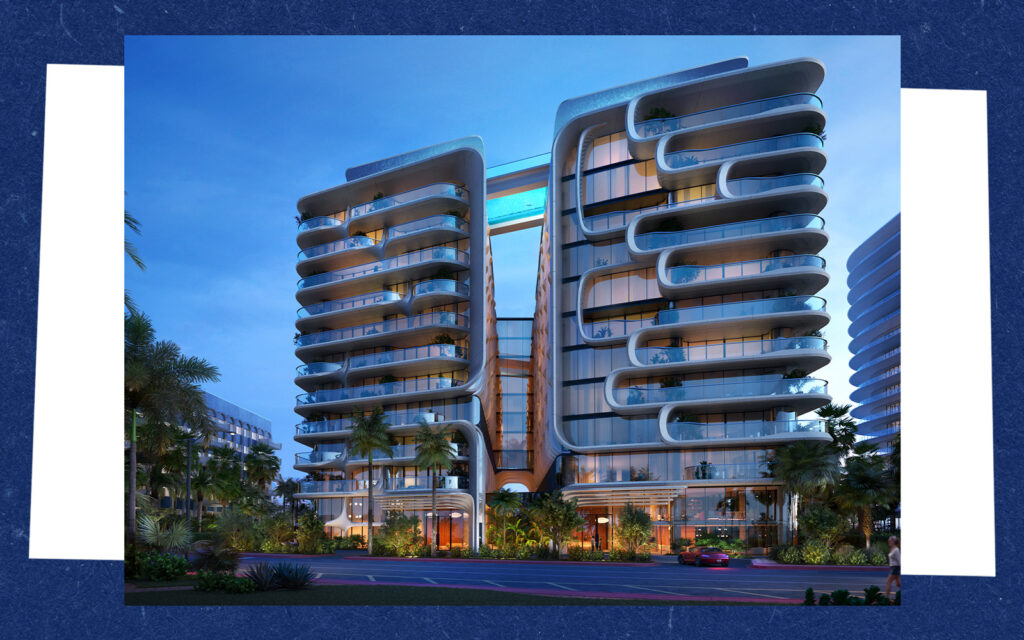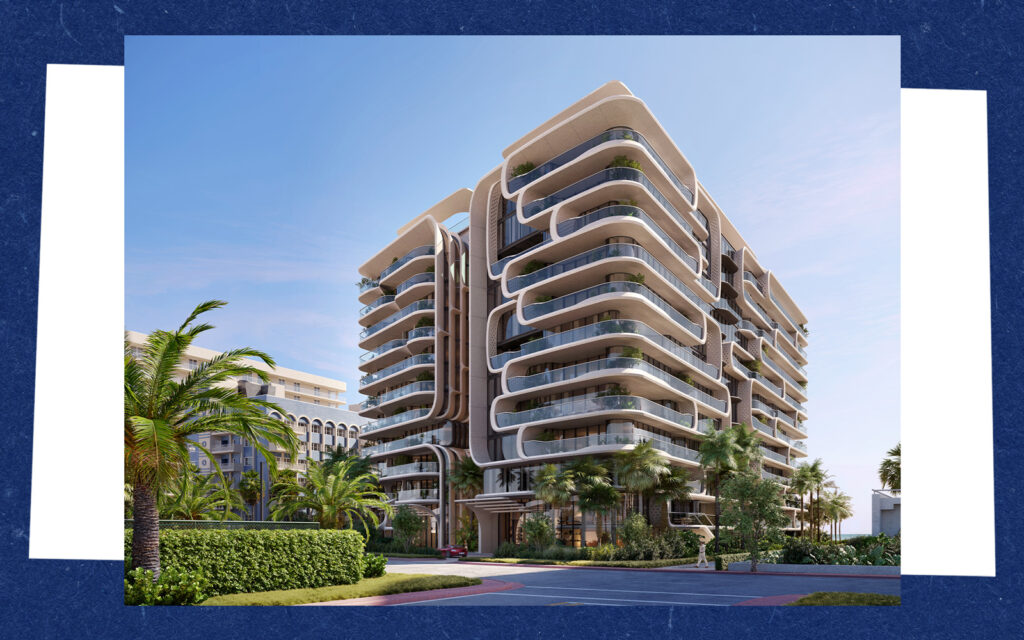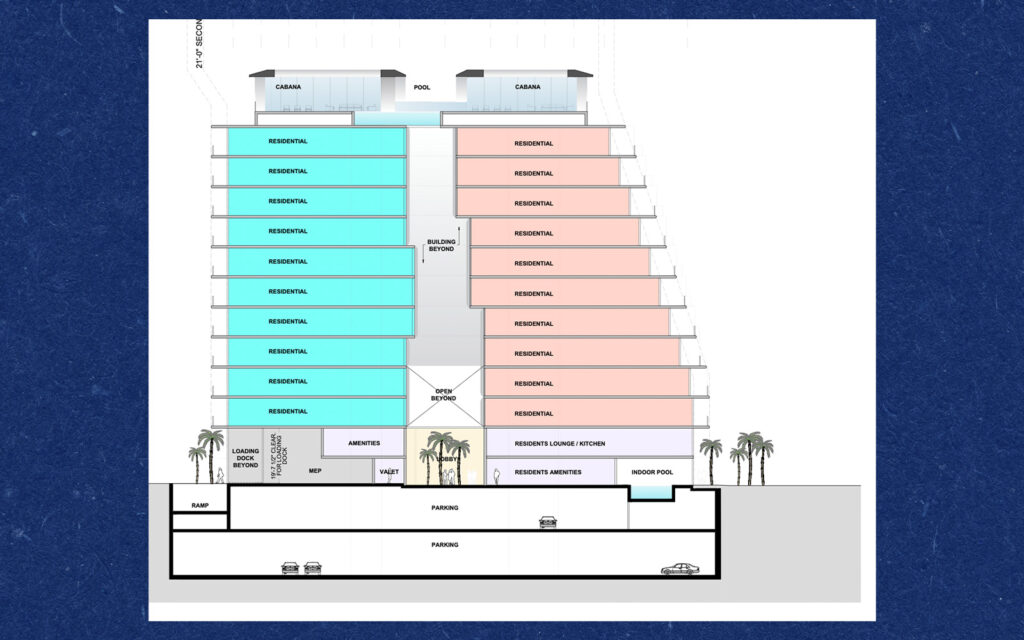The developer that purchased the Surfside condo collapse site faces a public relations test and a series of town approvals, as it moves forward with plans to build an oceanfront luxury condo on the property where 98 people died two years ago.
Damac Properties, led by Hussain Sajwani, wants to build a 12-story, 57-unit boutique condo designed by Zaha Hadid Architects on the site where Champlain Towers South collapsed in June 2021. It marks the first U.S. real estate project for the firm.
Damac expects to launch sales later this year or sometime next year of what it calls “the most luxurious project” to ever be built in Surfside, the developer said in a statement.


An affiliate of the firm filed two sets of designs for the development, a year after closing on its $120 million purchase of the 1.8-acre property at 8777 Collins Avenue, and two years after the collapse.
The stigma associated with living in a building constructed on the final resting place of nearly 100 people is expected to affect the project’s buyer profile and sales success, experts say. Dubai-based Damac will likely tap its buyer pool in the Middle East, as well as foreign buyers from other countries.
“[Sajwani] will market to people from his region of the world, and that’s who is going to buy there,” said one broker, who wanted to remain anonymous. “I don’t see him having an easy time selling to this part of the world.”
Real estate agents predict that the collapse will affect sales — but only to an extent.
“My guess is that people who are not familiar with the area, who may be from other countries, may not have that sentimental connection with the site the way people from South Florida may have,” said Andres Asion, broker and owner of Miami Real Estate Group.
Attorney David Haber agreed. “There’s always a demand for waterfront,” he said. “As time goes by, people from out of town will be less stigmatized.”
Pricing strategy
Brokers told The Real Deal that they predict the developer will try to sell the condos for more than $3,000 per square foot.
Damac has not shared condo pricing yet, but the firm is proposing a 381,522-square-foot building. Based on the size of the proposed project, it paid about $315 per buildable square foot for the land. Excluding amenities and the lobby, Damac paid about $374 per buildable square foot.
The proposed blueprints show the building could include an underground garage, which is much more expensive to build than an above-ground parking podium or a separate parking structure. The building also calls for a residents’ lounge, pool and cabanas.
Asion pointed to Eighty Seven Park as a comparable property. Units at the condo tower that is within Miami Beach city limits, immediately south of Champlain Towers South, traded for an average of about $3,000 per square foot last year, Asion said, citing data from the Multiple Listing Service.

With up to six condos per floor, units at the proposed Damac project will range from 4,000 square feet to 15,000 square feet. If Damac were to sell units based on a blended price of $3,000 per square foot, that could mean that prices would range from $12 million to $45 million, though smaller units on lower floors would likely sell for less.
“It would not surprise me at all if they set records,” said Joe Hernandez, a real estate attorney.
The current per-square-foot record in Miami-Dade County is held by Pat Riley’s sale of his condo at the Four Seasons Residences at the Surf Club in Surfside, which traded in May of last year for nearly $5,800 per square foot.
Broker Mark Zilbert, who owns his firm Zilbert, said that a Zaha Hadid Architects building on the ocean will “pull big dollars.” The late Hadid designed just one major project in Miami, the non-waterfront One Thousand Museum condo tower in downtown Miami.
If Damac truly focuses on marketing to foreign buyers, it will run up against the recently approved state law banning buyers from China, as well as restricting real estate purchases by nationals from Iran, Russia, Venezuela and several other countries.
“If you are a condo developer and targeting an audience of wealthy people worldwide, this may restrict your audience somewhat,” said Hernandez, of Bilzin Sumberg.
Local partners
Despite the sensitivity surrounding the site’s history, Damac isn’t expected to have trouble pulling together a South Florida-based team to market and work on the project, experts say.
“As brokers, our job is to present all properties to the buyers, and let the buyers decide,” Mike Pappas, who heads The Keyes Company, said.
Damac has been in talks with several of South Florida’s “leading brokerages” about marketing the project, Niall McLoughlin, Damac’s international senior vice president of communications, said in an email. None of the top sales and marketing firms would discuss their involvement, if any.
Berkshire Hathaway HomeServices EWM Realty “would consider” the opportunity, said Ron Shuffield, who leads the firm, though he declined to say whether it’s already been contacted by Damac. “We talk to a lot of people every day about the future developments in our town.”
Local firms already are consulting on the project. Hollywood-based ODP Architects is the architect of record, North Miami-based Savino & Miller Design Studio is the landscape consultant and Coral Gables-based Ocean Consulting is the coastal construction adviser, according to Damac’s application filed with Surfside.
Surfside approvals
The project approval process could wrap up by year-end, Surfside Mayor Shlomo Danzinger said. Prior to filing the official application, Damac representatives had informal discussions with Surfside administrators to understand what is allowed on the site, he added.
Next, the project would go in front of three town boards. First, a design review committee, consisting of town planners and other administrators, will give its official say. Then, the planning and zoning board, consisting of residents, will review the project, issuing a recommendation to the town commission. If the planning board votes against the project, its decision has to be based on either alleged irregularities with the code or legal precedent.
The board “can’t really decline a project because they don’t like it emotionally,” Danzinger said.
In the final step, the project will come before town commissioners to approve it.
Damac’s discussions with the town also will focus on impact fees it will pay Surfside, and its contribution toward town projects, such as a Collins Avenue water main project that aims to deliver more water to homes along the street, Danzinger said. While contributions are voluntary, most developers tend to donate toward the projects.
The official project plan filing comes as some family members of the collapse victims still are pushing for a memorial to rise on the site. The town has designated a portion of 88th Street, immediately north of the Champlain site, for a memorial.
Damac also reiterated that the town announced a memorial site on 88th Street.
Yet, a memorial on the actual collapse property could play into the success of Damac’s project, Haber said.
“We have to look in part at New York City and the World Trade Center site as an example — a tremendous tragedy,” Haber said, acknowledging the differences between the two. “The memorial itself, plus the museum, took away any stigma.”
Either way, Asion said, the site shouldn’t remain undeveloped.
“I think it’s also good for the closure, for that devastation that occurred, that progress is made on the site,” he said.
Read more



